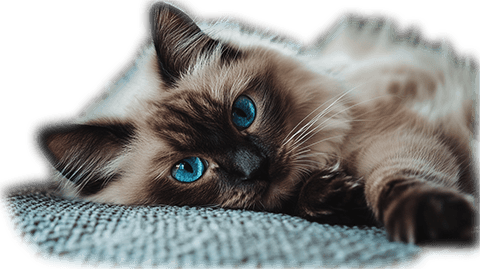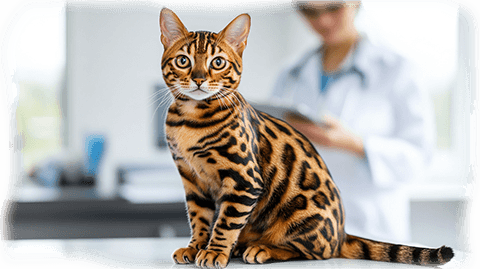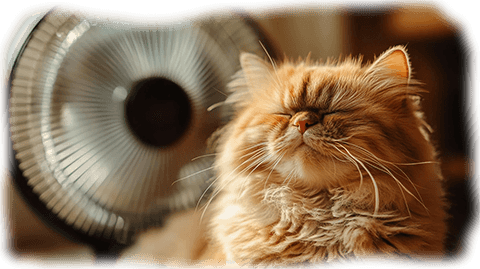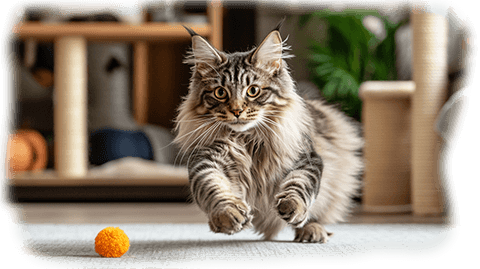Siamese Cats Health: A Guide to Keeping Your Feline Friend in Optimal Condition
Siamese cats are known for their striking blue eyes, sleek coats, and affectionate personalities. They are often highly social, vocal, and active, making them wonderful companions. However, like all cats, Siamese cats come with their own set of breed-specific health concerns that owners should be aware of. Understanding these potential health issues and taking preventive steps will help ensure that your Siamese cat lives a long, healthy, and happy life.
In this guide, we’ll explore common health problems in Siamese cats, along with practical tips on how to keep them healthy and spot early signs of illness.

Common Health Issues in Siamese Cats
While Siamese cats are generally healthy, they are genetically predisposed to certain conditions that owners need to monitor. Here are some of the most common health concerns associated with this breed:
Respiratory Issues
Siamese cats have a somewhat flattened facial structure, which can make them prone to respiratory issues. This condition, known as brachycephalic airway syndrome, is not as severe in Siamese cats as it is in other flat-faced breeds, but it can still cause problems.
- Symptoms – Watch for signs of labored breathing, noisy breathing, snoring, and frequent respiratory infections.
- Prevention and Care – Keep your Siamese cat in a clean, dust-free environment to minimize respiratory irritants. Use air purifiers to reduce allergens and avoid smoking indoors. If your cat has persistent respiratory issues, consult your vet for advice on managing symptoms.
- Treatment – In severe cases, your vet may recommend medications to reduce inflammation in the airways or surgery to correct anatomical issues. However, most cases can be managed with environmental adjustments and regular vet check-ups.
Dental Disease
Siamese cats are more prone to dental problems than some other breeds. Plaque and tartar buildup can lead to gum disease, tooth decay, and eventually tooth loss if not addressed.
- Symptoms – Look for bad breath, difficulty eating, pawing at the mouth, or visible tartar on the teeth. Red or swollen gums can be a sign of gingivitis.
- Prevention and Care – Regular dental hygiene is essential for Siamese cats. Brush your cat’s teeth regularly with a cat-safe toothbrush and toothpaste (Amazon affiliate link). You can also provide dental chews or specially formulated dry food to help reduce plaque buildup.
- Treatment – If dental disease has progressed, your vet may recommend a professional cleaning or tooth extraction. Early detection and regular dental care can prevent the need for more invasive treatments.

Progressive Retinal Atrophy (PRA)
Progressive retinal atrophy (PRA) is a genetic condition in Siamese cats that causes gradual vision loss and can eventually lead to blindness. PRA affects the retina, the part of the eye that detects light and sends signals to the brain.
- Symptoms – Cats with PRA may begin to have trouble seeing at night, may bump into objects, or may show reluctance to move around in dimly lit environments. Over time, the condition worsens until the cat becomes completely blind.
- Prevention and Care – While there is no cure for PRA, you can help your cat adapt to vision loss by maintaining a consistent home environment. Avoid moving furniture around frequently and use toys with sound or scent for playtime.
- Treatment – Unfortunately, there is no treatment for PRA. However, since it progresses slowly, many cats adjust well to their loss of vision. Regular vet check-ups can help monitor the progression of the condition.
Amyloidosis
Amyloidosis is a condition where proteins called amyloids accumulate in the organs, particularly the liver and kidneys. Siamese cats are genetically predisposed to this disease, and it can lead to organ failure if not treated.
- Symptoms – Symptoms vary depending on which organ is affected, but common signs include lethargy, weight loss, vomiting, and increased thirst or urination if the kidneys are involved.
- Prevention and Care – There is no known way to prevent amyloidosis, but regular vet check-ups can help catch the disease early. Cats with amyloidosis may require a special diet or medication to support the affected organs.
- Treatment – Treatment usually involves managing the symptoms and slowing the progression of the disease. For kidney amyloidosis, your vet may recommend a low-protein diet and medication to support kidney function.
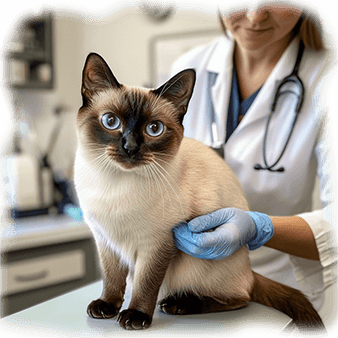
Obesity
Siamese cats are naturally slender and athletic, but they can still become overweight if they don’t receive enough exercise or are overfed. Obesity is linked to numerous health problems, including diabetes, joint issues, and heart disease.
- Symptoms – An overweight cat may have difficulty moving, become lethargic, or have a noticeable layer of fat over the ribs. You may also notice a lack of a defined waist.
- Prevention and Care – Monitor your cat’s food intake carefully and ensure they are fed a balanced, portion-controlled diet. Use puzzle feeders to encourage activity and prevent overeating. Regular playtime is essential for Siamese cats, as they are an active breed and require mental stimulation as well as physical exercise.
- Treatment – If your Siamese cat is already overweight, consult your vet for a weight management plan. This may include a prescription diet and increased physical activity.
Preventive Care Tips for Siamese Cats
Preventive care is the key to keeping your Siamese cat healthy and avoiding some of the common health issues they may face. Here are some tips to ensure your cat stays in peak condition:
- Regular Vet Visits – Schedule annual or bi-annual check-ups with your vet. Early detection of any health issues can lead to more effective treatment and management.
- Balanced Diet – Feed your Siamese cat a high-quality (Amazon affiliate link), balanced diet to support their overall health. Avoid overfeeding to prevent obesity. Consult your vet about the best food for your cat’s age, weight, and activity level.
- Exercise and Mental Stimulation – Siamese cats are highly active and intelligent, so they need plenty of mental and physical stimulation. Invest in interactive toys, scratching posts, and climbing trees to keep your cat engaged and fit.
- Dental Care – As Siamese cats are prone to dental disease, brushing their teeth regularly and providing dental chews can help prevent plaque buildup and maintain oral health.
- Monitor for Health Issues – Keep an eye on your cat’s behavior and physical condition. If you notice any changes in appetite, energy levels, or weight, consult your vet as these could be early signs of a health problem.

Monitoring Your Siamese Cat’s Health
Being aware of changes in your cat’s health and behavior is essential for catching any issues early. Watch for the following signs and symptoms that may indicate a health problem:
- Difficulty breathing or labored breathing
- Weight loss or gain
- Excessive drinking or urination
- Vomiting or diarrhea
- Loss of appetite
- Lethargy or reluctance to move
- Red or swollen gums
- Bumping into objects or difficulty navigating
If you observe any of these symptoms, it’s important to consult your vet for a proper diagnosis and treatment plan.
Final Thoughts
Siamese cats are a unique and beloved breed, known for their distinctive appearance and affectionate nature. While they are generally healthy, their genetic predisposition to certain conditions means that regular vet care and preventive measures are essential. By staying informed about the common health issues Siamese cats face and taking steps to prevent or manage them, you can help ensure that your feline friend enjoys a long and healthy life.
Regular vet check-ups, a balanced diet, and plenty of mental and physical stimulation are the cornerstones of good health for your Siamese cat. With the right care, your Siamese can thrive and remain a loving companion for years to come.
Further reading: “Siamese Cats: A Everything about Acquisition, Care, Nutrition, Behavior, and Health” (Amazon affiliate link) by Marjorie McCann Collier.
Affiliate Disclosure
This post may contain affiliate links, which means I earn from purchases made through links. Please see the privacy policy page for more details.

